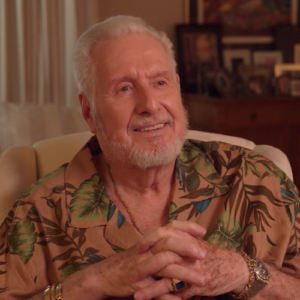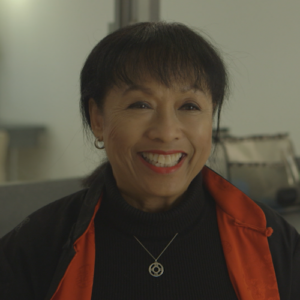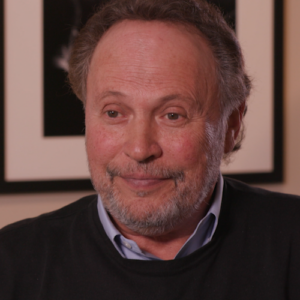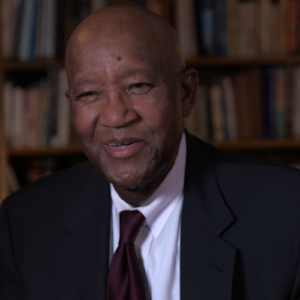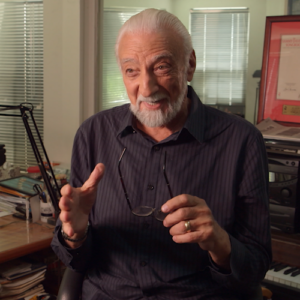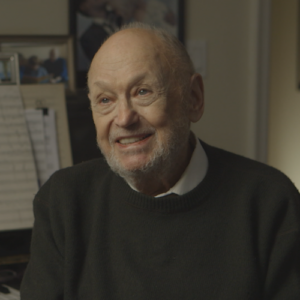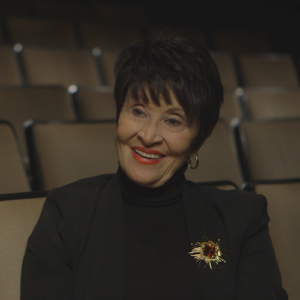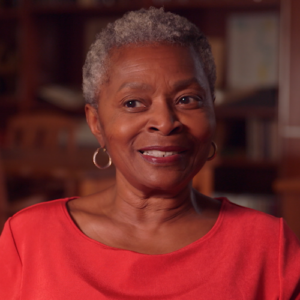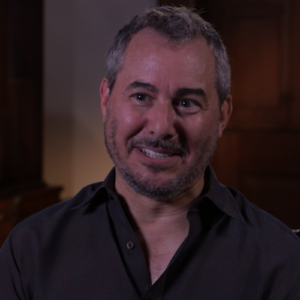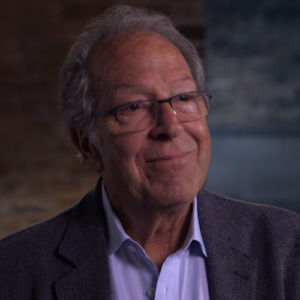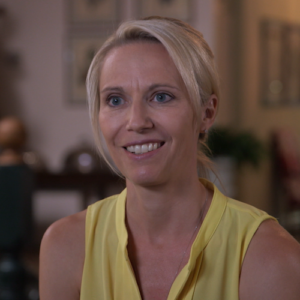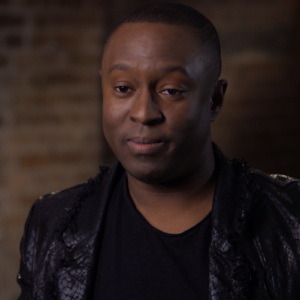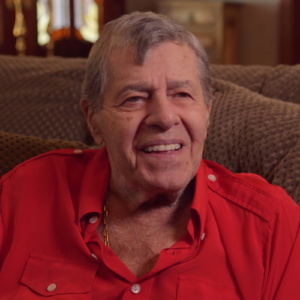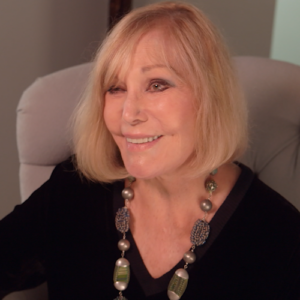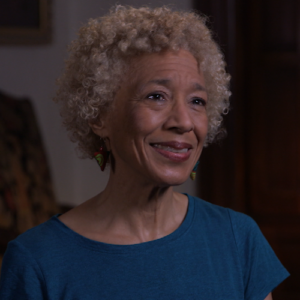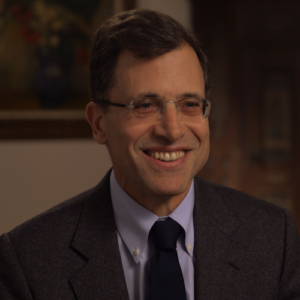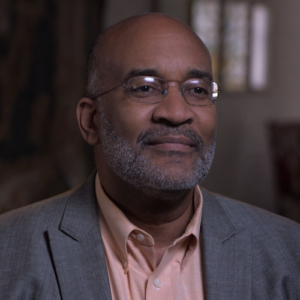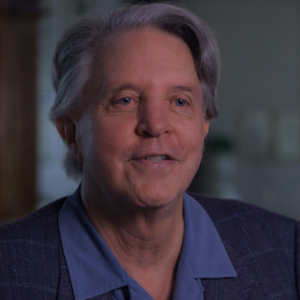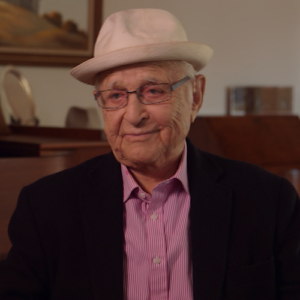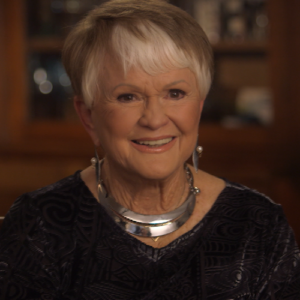Burt Boyar: My name is Burt Boyer, and I am in Los Angeles. And I was Sammy Davis’ close friend in New York. That was where we met in New York. And I became his biographer. And I wrote several books about him with him. “Yes, I Can” was the first, “Why Me?” was the second. And then after he died, I was able to publish a compilation of the two called “Why Me?” – called “Sammy” and then “A Photo by Sammy Davis Jr.” Which was a collection of his photographs. He was a fantastic photographer. He shot from the hip, but he was great. Well.
Interviewer: The documentary is subtitled The Many Lives of Sammy Davis Jr. What are some of those lives?
Burt Boyar: Well, it was the world’s greatest entertainer. He had great friend. He was a very, very charitable person. A very he was fulfilled. I can’t call him philanthropist, even though he did give away a lot of money. He was the first person to give money to all 40 of the Negro College, the United Negro College funds to each of each. Each of the colleges got money from Sammy. And in fact, President George H.W. Bush made comment on that, about there was it was a 60 minute 60th anniversary tribute to Sammy on ABC television. And they had a clip of the president, the elder Bush, who was who then said that he had been with the, you know, working with the United Negro College Fund for 40 years. And he remembered that Sammy was the first person ever to give money to all 40 of their institutions. Well.
Interviewer: When did you first become aware of Sammy?
Burt Boyar: I think and always aware of Sammy. Sammy Davis Jr was a figure in show business that I was totally I just always heard about him. He was I see him on television, of course, and I was astonished by his performances. So he was always in my mind, on my radar. And as a Broadway columnist at the time, I was excited to have him come to town. And he came. He arrived in town and Mr. Wonderful and I called him to say that he had something for my column and I did with everybody. And he was very warm. And so let’s have dinner together. So that night, he and he and my wife Jane, and I had dinner at Danny’s hideaway. And we got one of those chemistry things. You just meet somebody and you just love them and you just know you’re going to be friends forever. And he he got up from the table and he said, What do you say we have dinner, say, five nights a week? And we had dinner seven nights a week from then on for the whole year that he was in New York.
Interviewer: Fantastic. What did you think of Mr. Wonderful?
Burt Boyar: Mr. Wonderful was not a good play. It was a very poor play. The great thing about it was Sammy Davis Jr’s act, which he did. The last part of the show was was 40 minutes of Sammy Davis Jr. As often as in a nightclub. And it was spectacular. It was worth it. It was worth the price of admission. And you had to sit through the early part of the show in order to see that. But it was worth it. He was fantastic.
Interviewer: What did you do in entertainment before you started writing?
Burt Boyar: I before I started writing, I was a radio actor. I was Archie on Archie Andrews and had on the Superman commercial every day. And I was called Archer. I was Dexter Franklin. And on Captain Marvel, I was Billy Batson, the original Billy Batson. They moved from New York to Chicago, too.
Interviewer: As child entertainers. Did you and Sammy have shared experiences?
Burt Boyar: Sammy and I did not have any shared experiences. I lived a very simple life at home with my parents, went to school, went to school, called Professional children school, and went out and did my shows. And whereas Sammy was living on the road as a part of part of his father’s show and at first was a big show and then later became a trio. So our upbringings had nothing to do with each other.
Interviewer: What about Sammy Clawson survive the early years and grow into the powerhouse that he became?
Burt Boyar: Sammy Sammy’s early years were very, very good. Very carefully. Protected by his father and Will Mastin, who is not his uncle, but they call him in the room whenever there is a racial problem. When they couldn’t get into a hotel or a restaurant, they’d always say, Oh, they don’t. They don’t like us because we’re in show business. They’re jealous. And he was never it was never given the opportunity to understand racism. He didn’t know there were any difference. And he he just went through life protected by them until he went into the army. And when he went into the army, he had the bad luck to be drafted into the first integrated army, integrated infantry in the in the army. And it was murder. They they treated him horrendously. He was beaten up and he and he would wouldn’t fight back. He wasn’t he wasn’t a guy that would hit back. So he but he eventually did, of course, and he always and he got they painted in white even one day. It was terrible. It.
Interviewer: It is a heartbreaking experiences for Sammy, but those stay with him through his life.
Burt Boyar: No. Sammy. I think that Sammy was able to have the he has the tremendous mentality and the tremendous intelligence to to to be able to just put that off. And he learned what he learned from it was there was one guy who was his real nemesis, and Sammy was doing a camp show and everybody was going out of their minds how good he was. It was their screaming, his standing up. And this one guy who had been his real nemesis was sitting there pretending like he didn’t even notice. And Sammy realized then, this is my power. He said, if my talent is my power. And that’s what he said. He thought, I’ve got to be a star. I’ve got to be so big that they can never they can never get to me. And he did. And drove them forever.
Interviewer: Yeah. Here’s a semi quote. They’ll like me even if they hate my guts. How does that play out?
Burt Boyar: Sammy used to say that a lot of southerners and rednecks would come to see him, used to hate him. And I said, Well, why were they coming to see him? To sit there and hate me? But they never did. By the time they left, they they were in love with him because he was just so good.
Interviewer: He was always on, right? Well, what was his recreational life like?
Burt Boyar: Sami Recreational life was was. Beautiful women at home. We played all classical music. You never walk in it. You walk it. Expect to walk into Sammy’s house and hear a lot of popular music and not at all you hear classical music. Beethoven particularly. He had a very quiet private life. He didn’t have too much of a private life because he was always performing. He’s always traveling and on stage.
Interviewer: Didn’t go back to. Yes, I can for a second. But what will have changed in your first book?
Burt Boyar: Our first book was Yes, I can.
Interviewer: What are the challenges in writing your second?
Burt Boyar: Ready as I can was a very easy job because we were so close to Sammy by the time we decided to do it. And then we spoke to everybody around him and he opened up everything for us. So writing it was no problem. We were turned down by every publisher in New York, every main publisher. They didn’t want another book on showbiz and. Finally, our agent, Karl Brandt. Brought the book to the least likely person. Roger Strauss, the most literary publisher in in the world, really, of of English in the English language. And Roger love the book. And then from then on, there were no turning back. He did a great job of it.
Interviewer: And how is the book received by critics.
Burt Boyar: As it was received? Yes, I have got the greatest reviews of it that you could ever hope for. It was it was received throughout the country, in the South, especially as a fantastic, wonderful memoir of Merv Griffin, who recently died, told me it was the best book he ever read in show business. The reviews were colossal. We had the front cover reviews of numerous newspapers The New York Times, the Herald Tribune on the same Sunday, the Philadelphia Bulletin and the Los Angeles Times. They were all crazy about it. We got great reviews. It was breezed over. Herald Tribune called it one of the world’s where one of America’s finest and most candid and finest, most important autobiography of our time. I love the most important part.
Interviewer: How did you celebrate its release?
Burt Boyar: Actually, we never celebrated the release of Yes, I Can. It just it came out and Sammy was in Golden Boy and on Broadway, and we just sat there smiling.
Interviewer: When did it become a bestseller?
Burt Boyar: Instantaneously, it was picked up as a bestseller. It is a can became a bestseller for it was on there for 28 weeks, and it reached in a number one on the paperback list. It came out at number one, and it was reached number two on the hardcover books against the toughest competition we had. Truman Capote In Cold Blood and the two big Kennedy books by Summers’s and Schlesinger. So Formidable Horse Race.
Interviewer: You were quoted as saying that you couldn’t write some of the true history of Sammy. Mean, Yes, I can to be interviewed. How would you categorize what you had to leave out?
Burt Boyar: Only things that would make him uncomfortable. For example, the fact that he was the president. Kennedy asked him not to appear at the inaugural show, which which he had been planning on. And course, he had to tell his wife, we’re not going. Which, of course, was very embarrassing, humiliating. And we certainly didn’t want to put that into the public. And. His relationship with Kim Novak, with somebody else that we didn’t feel we should bring in. We did. We did mention in the second volume, the second book called Why Me?
Interviewer: But I want to go back to the early days. How would you characterize his upbringing with his father, Sam Senor and Will.
Burt Boyar: Master Sam’s and Will Mansion were like two fathers whom he was little. He was three years old when they took him on the road with him. And he they treated him like a little king. He was. He was their baby. And. And know Will used to bathe them in the sink, and they fed him all the right foods. And when when they were when they were broke and they couldn’t really have enough food for the three of them, they sit there and tells Amy they weren’t hungry and they’d give him the one order of food that they could get. He was he was treated beautifully. They adored him and took great care of him.
Interviewer: Do you think he ever regretted not having a formal education?
Burt Boyar: I guess he never expressed that. He didn’t have a formal education, never expressed regret for not having a formal education because he read so much. He read hundreds upon hundreds of books and he delved deeply into everything that interested him. I’m sure he would have loved to have the background and knowledge of a good education, but that wouldn’t be Sammy Davis Jr. He he was on stage instead of in school.
Interviewer: When you started hanging out with Sammy, he would purposely go to clubs like El Morocco or stay at the Sherry Netherland, the venues that were considered white establishments. Was he being provocative or just trying to live well?
Burt Boyar: Sammy. Was always criticized for, quote, living white. But he wasn’t living white. He was living well. Sammy would say at the Sherry Netherlands, which is around the corner from the Copacabana, which was the most logical place to stay, because, as he said, they haven’t yet made a hotel good enough. As good as I want to live. And he said, I’ll say, I want to say anywhere where my money and my fame allow me. And it was it wasn’t a matter of the race. Racial issues as a matter of human issues. He he just had a joke, too. He said, if I’m not going first class, the boat ain’t even the dock.
Interviewer: I’m going to name some nightclubs. Tell us what significance these clubs had. Sam It’s like the Copacabana.
Burt Boyar: The Copacabana was the absolute the apex. It was the top. It was. It was a place that he used to listen to on the radio when he was a kid living in Harlem before it. Even anybody, he would listen to Jack arguing and talking. I’m at the Copa. Where are you? And he’d say, I’m in my band, Harlem, in my in my, you know, in my nothing. But he wanted to play there because that was that was the greatest that was a tap play. That’s where everybody. All the top players. All the top show showmen. Sinatra. Jerry Lewis, Dean Martin. That was the place.
Interviewer: Stop. Stop saying Lexi here.
Burt Boyar: In Los Angeles slaps him, actually is sort of a step along the way. It was a move up from little out of out of town places. It was the first good series club in a big city, meaning Los Angeles.
Interviewer: Tropicana. Vegas.
Burt Boyar: The Tropicana. Sammy actually even had a piece of that. He became a it became a shareholder in he he played there, loved it. Because when you’re in Vegas and you’re Sammy Davis Jr, you are Emperor Nat King Emperor, they you can’t. I guess we were we were part of the party. And it was it was a party. They they treated us so well. Room, food and board, everything. And he just sign your name. The most beautiful suites. Sammy always had the most fantastic three or four bedroom suites with every, every every convenience. The second he’d ask for something would be. It would be there.
Interviewer: Was it always like that for him in Vegas?
Burt Boyar: No, it was not like that originally. In fact, the early days in Vegas were the first time they played Vegas for $500 a week at last. At El Rancho Vegas, they were not allowed to go into the casino or even enter the club through the front door. They had to go around the service entrance and go in that way. And finally they had to live on the west Side, which was the Harlem of Las Vegas. And he eventually got so big that they kept asking him to come back to play Las Vegas. And he said, No, I’m not. I’m not I’m not going back until my people can sit and walk in like I can. And and finally, one of them had the audacity to just suggest, well, how about we put a van, you know, like a really cool camper camper in the in the parking lot. He can live in them. And he laughed and, well, walked away from it. And eventually he was invited to stay at the hotel as well as anybody else would of his stature. And anybody could come in. He his grandmother, everybody, everybody was there. He always had his own own table. And he broke the color line.
Interviewer: Back to the nightclub, just under the impression from Sammy. And what it meant to him said the sands.
Burt Boyar: The sands became his home. The sands was owned by well, we run by Jack and Trotter. Jack had been the co operator of the Copacabana, which was owned by Frank Costello. And I think it’s very probable that Frank Costello owned the Senate to. Here, of course, at the Sands. He Frank Dean, they were all just they were treated like like royalty. And when they they deserved it, they were. They earned it. They they they drew in thousands of people. So it was it was not just because they’re famous, they they they were very, very valuable to the hotels.
Interviewer: To the mob. The mobsters owned most of the nightclubs.
Burt Boyar: I was I was never told that by any one of them. But that was certainly the impression. And I’m sure it was true. Yeah, the mob definitely controlled Las Vegas and they they owned it. They built it. Bugsy SIEGEL was were the first person to do it. They financed him. They felt he overspent. They felt it was a bad idea that but they continue. And of course, his bad idea was a great idea and became where it became and was owned by them for many, many years and run by them. And it was fantastic under their their ownership. And then the computer came in and all of a sudden everything, everything stopped.
Interviewer: Was Sammy ever indebted to the mob?
Burt Boyar: No, Sammy was never indebted to the mob. He was often indebted to a nightclub. He would borrow money and he would he would have to have to play a number of weeks in order to pay it off. But he would never indebted to the mob, as per say. He was, of course, like all entertainer entertainers. The mob had tremendous influence because they owned all the jukeboxes. They owned most of the nightclubs, the Copa, the Shay Perry in Chicago I don’t know about served here home, Herman, whoever was the owner, but I don’t know who would behind No. And of course, they owned Las Vegas and you couldn’t be in show business and a bit nightclub business and and not be subject to to their influence. But they didn’t own him.
Interviewer: Tell me what Ciro’s meant to Sammy.
Burt Boyar: The series is where Sammy really made it series when Sammy was. It was really quite an interesting thing when Serious was when Sammy was invited to play Ciro’s. That was very, very big. Really big. And. Herman, however, offered $500 a week and Will Mastin said no to our prize at 550. And Sam is going crazy to take the 500. No, our price is 550. And by good fortune, their agent had the sense to say to Hermann over, I’ll pay you the 50. Give them 550. And he did. And from then on, it was Sammy SA overnight. He was so big. It Ciro’s on opening night. It was Academy Award night. And everybody from all the Hollywood stars went from went to series after the show, after the Oscars. And Janis Paige was the headliner and she was a big favorite of them, and she couldn’t get on stage. Sammy and the Manhattan Trio were the opening act, and they were so powerful and Sammy was so powerful that they were banging the table. The silverware was was flying, and they were standing up in ovations and all kinds of things. And they wouldn’t let him off stage. And he had been told only do one encore. He did six and they wouldn’t let him off. And finally, Janis Page simply couldn’t get on stage. They wouldn’t have her. They were just more and more Sammy. And in fact. The next day. It was the Sammy Davis Jr. It was the Imagine trio. Sorry. Sammy Davis Jr. With Janice Page. She was moved from top billing. Second, she was. She was. She was a wonderful person and everybody loved her. And I. I feel badly for her and Sammy felt badly for her. It’s, you know, he never expected to wipe out another entertainer. He was he was too nice a guy, but he was just so talented and so powerful. He it just couldn’t be stopped when he ran out of impressions he had. They’re still calling for more. And he had heard Jimmy Stewart was saying it was sitting at the ringside Humphrey Bogart. You’re doing them all, Cary Grant. And finally they said more and more and more. And he didn’t have any more. So he did. Jerry Lewis, for the first time, just took a chance spontaneously, and it was fantastic. And Jerry with them. And Jerry came backstage after the show and it was fabulous, whom he gave him in making notes during the show, telling him things that he thought would improve the performance. And he and Jerry became great friends as a result of that. The Wilmington Trio was really kind of an old fashioned act, sincere and, well, we’re like old vaudevillians, and they were tap dancers and one after the other would go out and dance and then they would dance and then they sang behind Sammy in their fingers. And but Sammy did everything he sang. He he danced the tap dance so well. I mean, he was extraordinary. Fred Astaire. And he when he and Fred Astaire used to meet meet at a party. Fred Astaire was a high dancer and same age. Oh, no, not when you’re around. When. When you’re around. I’m a singer. But anyway, he was so powerful with it. He did the Impressionists. He played the drums. He. He just. He just did everything. He. He was his. He was a powerhouse so that they wouldn’t let him off. The night they opened a series, he was playing to almost every major star in Hollywood who had been at the Oscars. They’d all gone to see Janis Page. So it was Jimmy Stewart, Cary Grant, Clark Gable, Humphrey Bogart, Jerry Lewis, Dean Martin. They were all there. And that was his audience.
Interviewer: Will miss Steve and Sammy’s life on this payroll for many years after that night.
Burt Boyar: Yeah.
Interviewer: We will miss the good businessman.
Burt Boyar: Will Manchin was not a good businessman. He was a lovely man. He was very careful with money. And unfortunately, he didn’t live. He didn’t enjoy his money. He enjoyed it because he sucked it away. But apparently he thought it was taken from him. I don’t know by whom, but he did not wind up with it at all. He wasn’t a good businessman, but he he was he was a good, hard working performer. And he and he was smart and kept the bookers all happy and always, always reliable. And he would say the same, either two words in show business, show and business.
Interviewer: I was selling at the business end of it.
Burt Boyar: Sammy was actually a very smart business in the sense that he would say, You have to know when to take high and have nowhere to take low. And he was very he didn’t care about money. Sammy made a lot of money when he was dying. The last time prior to dying, he was making a quarter of $1,000,000 a week, a week in Las Vegas, Tahoe, all the casinos. He never cared about money. He always cared about. Performing, having what he wanted, being a star, and if any, if he needed a mink line coat or the first mink coat, he had it. But it was also very responsible. He left a lot of insurance for his children and for his wife. Altovise received a check for $1,003,000 plus five or six others. Each of the kids got half a million dollars in insurance money that was paid. It wasn’t just money left in the estate. It was paid by the insurance companies. And I have copies of the checks issued out of it.
Interviewer: Let’s explore the conversions you did to Judaism. How did that happen?
Burt Boyar: Sammy’s conversion to Judaism was really interesting. People made a joke of it. They didn’t believe it. A lot of them, he was advised by a lot of people don’t do that is just going to make you look like you’re a publicity publicity hound. They don’t think it’s a Jaguar or. But it wasn’t at all. Sammy was very serious about it, as he saw in a relationship. Equated the struggling of the Jews with who would survive 3000 years of it with the 300 years of of the American Negro. And he. He he wanted to know why. How What do they have that made them handle it? How did this how did they survive? And that’s really what what drew him to it. And he read it and read and read as he read everything. And he decided he wanted to become a Jew. And he was very, very serious about it. In fact, when I was living in Spain, we were writing Why me? I called him a ham kipper. Just greet him and he wouldn’t take my call. And later he called me the next day and said, Sorry, baby, I didn’t really want to talk about this book. And I did. He wouldn’t. He wouldn’t do anything. He was very, very serious about it.
Interviewer: It’s funny. When he was shooting Porgy and Bess, Sammy refused to work on November. I, Sam Golden, will respond to that.
Burt Boyar: When he was shooting Porgy and Bess. They had him booked to play on Yom Kippur and he went up to go into office and he said, Mr. Goldwyn, I can’t I can’t work on Yom Kippur. And Golan said, If he’s talking about you, you’ve got to have your schedule. He said, I can’t. So I’m Jewish. And Sam Goldwyn said, You’re Jewish. And he said, Yes, and I just can’t work on Yom Kippur. It’s going to cost me $25,000 for you not to work. He said, I’m sorry, sir, I just can’t help it. I just can’t do it. Finally, finally, Goldman said, okay. And when he left, he said, I can deal with directors. I can deal with writers, But a black Jewish one, I can’t handle that.
Interviewer: Was Eddie Cantor involved in Sammy’s conversion?
Burt Boyar: Eddie Cantor with a wonderful, wonderful man who had Sammy on his show for a number of times. And he he gave Sammy a measure and Sammy appreciated it. And I guess it was around the time that he was he was finding the relationship between the Jews and the black people. And he held that. He kept that measure very, very reward all the time. And when he had an accident, it was as he was being taken into the operating room, he had an automobile accident, which he thought was I. And when he had it holding the Moses clenched in his fist. And Tony Curtis and Janet Lee were there. And they had to open his hand and take it out and left an impression in it in his hand. That didn’t last forever. But it was it was very, I don’t know, symbolic or very whatever.
Interviewer: You mentioned, he had a lot of ladies in his life. So there’s a good name, some names, and tell us what they meant to Sammy. Ava Gardner.
Burt Boyar: Ava Gardner was a good friend. There was no sexual relationship between them at all. No romantic roommate relationship. She was a kind lady who loved him. Everybody did. And she went to visit him in New York. She was in New York, and she went up to Harlem. He was playing there. I can’t remember the name of the club, the the Apollo. And she she she appeared on the at the Apollo. She was at the Barefoot Contessa at that time. And she walked on the stage barefooted. And she just like the house fell down. And then Sammy Davis Jr. And Ava Gardner on stage. So, of course, it created a tremendous amount of publicity. Sammy And have a confidential magazine article. But it. Oh, baloney. There was. It was. It was friendship.
Interviewer: Eartha KITT.
Burt Boyar: Eartha KITT and Sammy were kind of. A lot of friction. She either resented him or. I don’t know. I don’t know. I don’t really know. I know they didn’t get along. I don’t know.
Interviewer: Chita Rivera.
Burt Boyar: Chita with Chita Rivera was in Mr. Wonderful. She was the capital of the dance. She’s a dance captain. And she was Sammy’s girlfriend for a number of years before she became the Chita Rivera. And she was a great friend of ours. And she was. We were always together with him every night in his apartment. And after the show, we all we’d all meet Bette Midler, Chita, Sammy, myself, Jane, and a fellow named George Gilbert, who was a co-producer of Mr. Wonderful and a fellow named Michael Wesley, who was the assistant stage manager. And that was our group. And we would always be there with then Chita was there always.
Interviewer: It’s Marilyn Monroe.
Burt Boyar: Marilyn Monroe is another one of those things that people like to say, Oh, Sammy and Marilyn Monroe or a hot item. They were great friends. She admired him and he loved her. He loved gorgeous women. And and how could you not love Marilyn Monroe? And so but those are all gossip things. Those are all.
Interviewer: Kim Novak.
Burt Boyar: Kim Novak was real. That was a real romance. He and she were very, very much in love. They actually Kim Novak and Sammy. I think Kim Novak was probably the first woman he really loved. And they were very serious until Harry Cohn heard about it. And Harry Cohn had her contract at Warner Brothers, a Columbia. And he he decided that he had to break them up because at that time it was an interracial relationship, which would be death at the box office. And he couldn’t have that. So he took out a contract on Sammy. He was very connected and he took out a contract on Sammy. And Sam Giancana flew from Chicago to Las Vegas to see Sammy. And he said, You’re in trouble. He said, You have got to get out and do something about it. And he said, Harry Cohn has a contract out on you and I can’t protect you in Las in Los Angeles. You can’t go home. I can protect you here. I can protect in Chicago. I can protect you, New York. But I’ve got no Jews in Los Angeles. And these guys will hurt you. They will. And they love it. They. They’ll take out your eye, they’ll break your leg, and they do it. And they. They enjoy it. So do something. So what Sammy did was he married a black girl he used to go out with who was in the chorus at one of the shows downtown Las Vegas and Luray White. And right here, he said to a very candidly, I need to get married publicly. And he paid her $10,000 or something. And she was very sweet and she was very kind. And he and she understood it was just temporary and just just for the publicity. And they had a big ceremony. Harry Belafonte was there and Joey Lewis was there. And it was very, very well publicized. And Harry Cohn withdrew the contract.
Interviewer: It was last time Novak saw.
Burt Boyar: Kim Novak saw Sammy when he was dying. She came in to the hospital, Cedars-Sinai, and noticed and went up to his room. Very few people were allowed there. He he had very strict security. He didn’t he didn’t want to be seen waiting £97. But he saw Kim and she. But obviously happy to see him. Very sad cause as we were, it’s very hard to see Sammy weigh £97. And he had a had a hole. Hold his throat and want to talk.
Interviewer: Given the diversity of women who saw. People are still accused of having a blond fetish was a true. Or did you just have a lot of gorgeous women?
Burt Boyar: He just loved women. He loved gorgeous women. And the idea they liked white women. It was was of course, he like white women, like every woman. And she was beautiful. He liked her. It was like a regular thing in the papers. I’d love to get a hold of items about Sammy and white women. And Confidential magazine did story on Sammy and Kim know and Marilyn Monroe and Elizabeth Taylor, all of whom were really friends. But they were very close friends. He had no known romantic relations with them. We were with him one night in New York at the Harwin Club, and he had with him a beautiful, beautiful girl. Her name is Harleen Harris, and she was a model for Ebony magazine. And the next day in the papers, there was a column I can’t remember whose it was. Sammy Davis Jr was at the of with gorgeous model Harleen Harris. Not mentioning that she was black, leaving the very strong impression that she was white.
Interviewer: What happened when Sammy met me?
Burt Boyar: Sammy saw my Britt. We had having lunch at the commentary at 20th Century Fox and she was making the Blue Angel and she was gorgeous, apposite, ravishing. And she walked in and Sammy just hit. He went all aflutter. And I don’t know how you describe it when you see someone for the first time that he just fell in love with her right then and there. And he pursued her a little bit, took a little chat, a little, getting to know her. And then he was happy to marry her and he loved him.
Interviewer: He tried to be a good husband.
Burt Boyar: You know, the problem with being Sammy Davis Jr and being a husband, they don’t mesh like being a father and Sammy Davis Jr. Is he’s too busy being Sammy Davis Jr. Which he has to be. He had to be just to stay free and able to traverse the world and like anybody else. So. It is the break up with my Brit with not due to being a bad husband or a bad father. It was due to the fact that he couldn’t be a good father. He couldn’t. He couldn’t. She wanted to go out in the park and play ball with him, with the kids. Throw a ball. Sammy didn’t have throw a ball. He literally didn’t know how to throw a ball. He had never done it. He could sing and entertain and thousands of people would love it. But he didn’t. He just couldn’t throw a ball. And he said also, if he walked in the Central Park with a couple of kids, it would be a mob scene because he was a golden boy at that time. And what would happened really with with Sammy in mind, it was a sale. They survived the worst racial. The worst problems of race you can imagine. Sammy was afraid to take her out to dinner in here in Hollywood because of the possibility of somebody getting out of hand. And so he used to be we were watching the house and he would say, let’s have a party night and hire a party chef. And he will all get dressed up to the nines and we’ll it’ll be a party. So my we go out and buy a new dress. Jane would go out and buy a new dress, and I wore my best, whatever it was. And Sammy appeared, after all, downstairs. He appeared we had his he had a sunken living room, and he wore clothes magnificently. And his clothes were sensational. And he wiped us all out. We all thought we looked so good, But he. He was. He was great. But what happened to their marriage? Is he. They survived all the racial problems perfectly, but they weren’t really what each other wanted. My wanted very much to be a wife with a station wagon full of kids, taking them to school, picking them up. She was a house house proud, and she had never wanted to be a movie actress. She had been a dental assistant and she’d been found by some big Italian movie producer, and he made her a star. And what happened is. On a given Sunday. Sam is okay. I’m going. I’m going to take my day off and I’m going to do it in Golden Boy. And they had a house in New York, and he said, I’ll take the kids out and we’ll spend the day together. And she was thrilled. Then what happened is Tommy Thompson, who is the Life magazine entertainment editor, wanted to do a pictorial picture story on Sammy and on Golden Boy. And it happened to fall on the only day available Sunday because he wasn’t available early days. So sure enough, he said, okay, I have to do it. And that that’s when my dad that’s enough. I just can’t handle that anymore. And she took the kids and went back to California and they got divorced. And later when when Sammy died, somehow my didn’t have a car. I don’t know why, but when we went out to the to the to the cemetery. She drove back with us and she said, You know, the stupidest thing I ever did was divorce Sammy.
Interviewer: But look, if you want to pick up some thoughts on the Copa, and we welcome that to me.
Burt Boyar: Sammy Davis and the Copa are really an interesting story. He always wanted to play the Copa. It was the place to play. And he used to listen to on the radio when he was up in Harlem and Jack Agnew and say, I’m in the Copa, where are you? That was his slogan. And Sammy was invited to the Copa by Frank Sinatra. Frank was playing there, and I wanted to come see the show. And Buddy Rich and he were going together and they went down to the Copa and the doorman stopped them and they said, You have a reservation? But he said, Yes, I have a reservation. And they said, You don’t have a reservation here. You’re looking at Sammy and Buddy Rich probably slugged him. And Sammy said, Come on, let’s forget about it. So they wouldn’t let him in. Another time he went there and Frank said, What happened to you? He called Frank, called him and said. What I heard, What happened is, are you coming to the Copa? You are going to come and help as a prank? I don’t really. I don’t want to make trouble. Is it? You are coming to the Copa tonight? So Sammy did okay and he went down to the Copa and the door open and there that Frank has a lot of people waiting for him. And they brought him in to the perfect table, Frank’s table. And he sat there and he watched the show and he was very excited about being there because the Copa was it was it was really the place. And when he first played there later, it was interesting. He went into rehearsal during the day and he saw this this place that was the Taj Mahal of nightclubs. And it was just a restaurant with tables stacked on top of each other. And guys were wiping off all the mirrors and all the tobacco smoke had created gunk on on the mirrors. And it was just just another place he really, like, opened. But yet he he still was thrilled to be there. And of course, he was fantastic. He had a great, great, wonderful run.
Interviewer: It was the first place you saw him perform like.
Burt Boyar: At the Copa. I saw him at the Copa for the first time.
Interviewer: You know, you and I were talking earlier, but when your history here is music, recorded music, it’s also what it was to see it live. Can you can you describe it was like seeing him live at the Copa or seeing.
Burt Boyar: Seeing Sammy at the Copa live was so much more vivid and so much more exciting. The atmosphere that he created as opposed to seeing him on television, he did the same things. But he he was he was their flesh and blood. And he would do things that were incredible. He was he would stand near the piano still and jump up onto the piano, a grand piano. And it was it was an athletic feat. But he did it. And when one night he told me I almost didn’t make it, I was hanging on by my toes. And anyway, he was. He was absolute dynamite at the Copa.
Interviewer: Let’s talk more. Let’s talk about Frank Sinatra in a 60th anniversary salute to Sammy Davis Jr. Frank called Sammy his best friend.
Burt Boyar: He said, I’m your brother. You’re my brother. Yes.
Interviewer: In a complicated relationship. Many people saw. Sammy is Frank’s flunky, his sidekick. Sammy saw him as a big brother. Well, just. Just go through what the relationship was really like to connect it to.
Burt Boyar: The relationship between Sammy Davis Jr and Frank Sinatra. They were brothers. They met early on when Sammy was playing up in the Seattle editorial pages, and Sinatra was touring as a as the voice singer for Dorsey, Tommy Dorsey. And they met backstage and Frank said, Hi, my name is Frank and I’m Sammy. And they hit it off. They’d sit on the stairs and talk to each other, and then they go to go and do their shows. And then Frank was playing at the the Capitol. And the capital in New York run Broadway, and he needed an opening act. And everybody’s telling him, get the Nicholas brothers, get this one, get that one. He said, No, I want I want Sam. I want a kid named Sam. And his his father is uncle. And they say they knew who he was, Sammy Davis, Jr. He said, Yeah, I think that’s his name. And it and he said, I want you to pay him 1500 a week. They said, We can get the Nicholas brothers for 4000, pay him 1500 a week. And so Sammy and, and Will and Trejo played at the Copa Play and played at the capital and it was there and they were there was a party downstairs after the show one night and Sammy was doing entertaining and doing impressions. And Frank came in and heard him and he said, Gees, you should put those in the act. And what he didn’t know is that the manager of the show had had it at that time, down so many minutes and had he couldn’t do the impressions. And Frank said, also, get yourself your own style. You sing great, but don’t do it. Don’t be influenced by me. Don’t get your own style. And he did. And that’s Frank was always there for him.
Interviewer: Yes, it was. But the impressions were really kind of. Will Mastin and Sam Senior were very nervous about him doing impressions of white people. Why was that.
Burt Boyar: When Jamie first started doing impressions? They were, of course, of famous people Edward G. Robinson, Jimmy Cagney, Fred Astaire. And we’ll mention he just put them in, put them in the act on his own. And we’ll mention took them backstage afterwards and said, you can’t do those people are going to hate it. They go they’re going to hate you. They’re going to think you’re making fun of them. You can’t do that for white people. And Sammy obviously could do them from white people very well. And everybody loved them. Nobody was offended. Nobody thought they would make fun of them. But they were. They were. Will was an older man. He was afraid. And because of his background, it made sense.
Interviewer: His availability. And we’ll talk about other. Men in Sammy’s life and what their significance was to him. And tell us something we may not know. Sammy And then these men. Jerry Lewis.
Burt Boyar: Jerry was wonderful. Sammy On his opening night, Astros, Jerry Lewis sat in the audience after watching Sammy do him in front of him, and he was making notes for him, like, don’t hand your props to your father and your uncle like there is still your service, is it? Just put him down himself. And he said, also, you talk too good. You sound like Laurence Olivier. He said, You just talk like a regular tonight, like you and me. And it was you and me that made it made me feel better. Because Sammy first said, What do you mean? I talked to. That’s how I talk. And he said, No, no, you sound like Laurence Olivier. Talk like you do. But we’re talking now, you and me. And they only made a typical racial thing out of it entirely. And he made several notes like that. And he was very they were very, very kind and very warm. And and then then, of course, he said, and do me a favor, get out of the business. I don’t need you. I was doing fine until you came. But he was wonderful to.
Interviewer: The both song and dance, man. They both could sing. They both had a great sense of humor. They both hosted variety shows where they competitive with one another, with Jerry Lewis and Sammy competitive with one another.
Burt Boyar: Not at all competitive. Sammy and Jerry were not the least bit competitive. In fact, they worked together years later at the MGM in Las Vegas because neither one of them could fill the room alone. It was amazing. The big rooms were really tough to fill on a seven day basis. So Jerry and Sammy both played. I think it was the MGM.
Interviewer: His relationship to Quincy Jones.
Burt Boyar: Sammy and Quincy went back a long way, Quincy, because Sammy looked at Quincy as a genius. As a genius. Arranger of music. Conductor. Producer. And he was really crazy about Quincy and Quincy. I loved Sammy. In fact, Quincy wanted to do a Broadway show called Sammy.
Interviewer: Whatever happened to that?
Burt Boyar: It just Quincy optioned the rights to. Yes, I can. Why me? For 12 years. And he for some reason, it just it just dropped it. He what? He it. I think what happened is he outgrew it. Quincy Jones became an international philanthropist. He got involved in projects making water for people in Africa who didn’t have clear water. And he became involved in major, major things. And I think that producing a Broadway show was became too important to him. And so I think he just outgrew it.
Interviewer: Harry Belafonte.
Burt Boyar: Harry Belafonte and Sammy were very close friends, and Harry was a major activist for civil rights. And Sammy went with Harry on everything. He went to Selma with them, scared to death. He had to do it. And it it was not easy for Sammy, whose one year on Broadway in Golden Boy. So he had to tell the producer to shut down for a couple of days. Seats were sold, sold out. But mainly he was physically afraid. He it was one of those things. I can’t go, but I have to go. I internally, he just had to go. He had to be there. He could not go. And so he of course, he went and he faced the realities of the people that were down there making all the trouble.
Interviewer: Was he still married to mine at that time?
Burt Boyar: At that time he was, yes.
Interviewer: Do you think that was part of his fear?
Burt Boyar: No, I don’t think you didn’t you I don’t think that being married to mine, was it part of an issue? I think it was simply that it was it was the two problems that he one, he was under contract to be on Broadway in the show, and it was sold out. And the other was his physical fear of going there. But he overcame both of those.
Interviewer: What is Sammy’s place in American politics?
Burt Boyar: Sam. His place in American politics was simply that he was a guy that AP loved Nixon because Richard Nixon had more black people working in the White House than any president before him. Richard Nixon invited him there, entertained him there since Vietnam, where he felt he could do a lot of good. And he did entertain the troops right up front in the in the fighting area. He’d go out where there were eight guys and perform for them. They they would say to him, keep it down. Charlie, I can hear you. And but he also did very important things there. He found that the drugs were very easily obtained there. There were women that just brought them. And so a lot of the soldiers used them and they were put in a stockade as a result of it and the barbed wire and all that stuff. And Sammy felt that was wrong and he was offended by it. And he promised them, When I get back, I’m going to talk to the president and we’ll get the barbed wire will come down. And it did. He was. He had Nixon’s ear. Nixon would talk to him as a. Tell me something. What’s the right word? Is it do I say colored or Negro? He said, no. He said he said today black is the right thing. He said. It used to be a pejorative word, but now it’s since the song Black is Beautiful and say it out loud, I’m black. And that black is perfectly acceptable.
Interviewer: Yes. To the black Power movement. The black of beautiful movement. Sammy became hungry. I saw Brother Sammy.
Burt Boyar: Sorry.
Interviewer: Sarah became what I call a soul brother. Sammy?
Burt Boyar: Yeah.
Interviewer: Was that political? Was it just trying to stay current?
Burt Boyar: Sami always tried to be curt. He was. He was he he didn’t want to always be the old vaudevillian, after all. Remember, he started he started way back. And if he’d say dress the way he was when he was young performer, he would be completely out of place. So he he was doing things in the later years as the time of the things of the moment, like when he when he didn’t hear come to judge. That was something that just it was it was of the moment. And I mean, kiss it kissing Archie Bunker on that was.
Interviewer: You come to judge. It was actually kind of a take it from the Chitlin circuit Chitlin circuit routine that he I guess, updated.
Burt Boyar: I’m trying to think the name of the man who actually did it first. It was he was married.
Interviewer: Like meet me or.
Burt Boyar: Take take me, you know. Pigmeat Markham. Markham.
Interviewer: Tell us about how Sammy took his ball field image and updated it.
Burt Boyar: Well, he always. He always sang the most current songs he would include. He always has his basic songs. Birth of the Blues. And so. But he also, for example, he was a. Crosby, Stills and Nash were very hot. He was doing their music and he always kept trying to be curt.
Interviewer: During that period with 1968. A former lover of his, Helen Gallagher, who was kind of a blond sex symbol, went backstage at the Copa and noted The Devil Wears Black all the same. His new entourage was black. Sammy introduced her. To his new entourage and said, This is my soul brother. So and so is my soul sister. So and so. Helen responded, I remember when you were white. Is that a fair response?
Burt Boyar: Not at all. Not at all. Sammy was Sammy hired the people who work for him, who were the most the most equipped and correct for the job, the best people for the job. His conductor at that time was Maudie Stephens, a white man. Helen Gallagher saying, I remember you when you were white. Is it just a joke because you had a lot of black people working for and they were the best people There were. Stage manager was black with his all the people that red took care of his sound and the music. They were all black. His conductor was. I don’t know what I don’t know when it was that she said that, but she. It could have been before George Rhodes became his conductor. And then he remained as a collector until he died.
Interviewer: Let’s talk about Sammy as an actor. What was your favorite role of his.
Burt Boyar: Sportin Life in Porgy and Bess? Sammy’s acting career was a very hard, hard to get. He they wouldn’t they wouldn’t. They wouldn’t put him on on shows. As an actor, they had would carte blanche on any musical show, but there was no way he’d get an acting role. He wanted to act. He wanted to broaden himself when he couldn’t get on any of the shows. And finally he got on the G Theater, and I can’t remember which show was it? He did several of them. And originally the fear was that the South would stop buying refrigerators from G.E.. As it turned out, he drew so many eyeballs, the out drew Dinah Shore, who is the biggest thing of the time. And from then on it opened up the fear of having Sammy as an actor just disappeared. He he became perfectly available. He did about I don’t know how many, but 20 or 30 television shows as an actor. I think his role in Porgy and Bess was was one of his best. I think it was his I think it was his very best when he played Sportin Life. He was sporting life.
Interviewer: Yes, he was hit. The second Broadway show ended a great success as an actor. A golden boy. What is what a golden boy being for Sammy.
Burt Boyar: Golden Boy with the second show he did on Broadway. Sammy wanted to be on Broadway as an actor to broaden himself. He didn’t believe that he should be just a nightclub performer. He felt he had in order to have stability and longevity, he needed stature or bases to be on television. And certainly Broadway was important and Broadway was where he did Mr. Wonderful. And then that was very helpful to him. But Golden Boy was his second show on Broadway, and he loved it. He loved the story that Clifford Odets had written, and he loved meeting with Clifford Odets, and they adapted it to modern time, making him Joe Wellington. And he it was one of the greatest opening scenes that I’ve ever seen on Broadway. It was a it was a choreographed fight in a ring, and it was a spectacular and every critic was bowled over by it.
Interviewer: Joel Wellington was a boxer. And he has a year away. Girlfriend. Was art imitating life in that show.
Burt Boyar: He had a girlfriend in that show, and it was really very dangerous because what they were they were trying out in Chicago, there were murder threats. And she had to have a bodyguard full time. And he, too. And it was very, very serious. The idea of him kissing a girl on a white girl on stage, it went down very badly. But again, his courage was was colossal. He he couldn’t be told, you can’t do this or you can’t do that. He was just he was if it were if it was right. If that’s how. Clifford, let’s roll it. That’s how we want it. And he did it and he got away with it. Che broke another barrier.
Interviewer: During the run of Golden Boy. Sammy produces and stars in a man called Adam. He records. Five albums, hosted three television shows, all culminates with the release of Yes I Can. How did he manage his time?
Burt Boyar: During the Roman golden boy Sami was. Making a movie called A man called Adam. With Frank Jr. He was doing an NBC television series, the Sammy Davis Jr Show. He had making various record albums and he was just running himself ragged. If you’re doing eight shows a week in Golden Boy. And it was it was really more than anybody could do. And as a result, the television series were not very good. It wasn’t up to his standards because he couldn’t give it any time. He got the best people as his guests. He had Richard Burton and Elizabeth Taylor for his first show. But he didn’t have the time to really understand how to do it right.
Interviewer: Do you think he burned out during that time?
Burt Boyar: He didn’t burn out. No, he he just got stronger. But he he simply did too many things to do them at his normal best.
Interviewer: I think, yes, I can reinvigorate him at that time. It became an enormous hit. Wasn’t it filling a vacuum in America’s understanding of black people?
Burt Boyar: I remember when Yes I Can was published. We got a lot of mail and it was all very good. I remember one girl wrote to me from Texas and she said, you know, I just started I’m just starting to work as a schoolteacher and I’ve just read your book and I want you to know my approach to my children is going to be entirely different than it was before I read your book. It was really a very wonderful thing to read. Sammy said that in a lot of people, many people came to him and said, I didn’t like you until I read your book, but now I love you.
Interviewer: See why. Out of these cameras out to be used in the late sixties. Is it fair to say that all of was as black power, like.
Burt Boyar: Altovise was a black girl who worked as a in the course of Golden boy in London, and he was going out with Lola Falana at that time was also in the show. And I don’t know what Black Power Girlfriend means. He never used the word black power. He would he would go like this peace and love. That’s all he would do. I never heard him say black power, but he married Altovise. His he fell in love with her and she was beautiful. And they were married for 20 years.
Interviewer: Or she like.
Burt Boyar: Alto was fun. She was she was full of fun. She was a great companion to him. But they kind of went separate lives because Sammy was on the road and he when Sammy on the road, he was he was a magnet for for girls. And he just had parties and she understood it. And they just accepted that as the way that her life was. And she didn’t resent it. She accepted it, and they just went along.
Interviewer: His relationship with Nixon. He hugs Nixon. It’s all over the press. It certainly hurt his relationship with the black community. Do you think if he had to do it over again. You would have done that? We would have distanced themselves from Nixon.
Burt Boyar: Sammy never regretted anything. At the end of the book, we say Ken, he says. If what I’ve done all my life, I can’t remember exactly how he said it, but it came down to it. Everything I’ve done got me to where I am today. At that point, he did have a child with my and he was very happy and his career was very hot and I would never change anything.
Interviewer: So he said he was always inspired by Sierra Leone de Bergerac. The extravagance of certain it was gestures. What were some of Sammy’s extravagances?
Burt Boyar: Well, his great gesture was not really. It was really not a gesture. It was it was a matter of loyalty and generosity. When he was a kid and vaudeville came apart and there was just the Will Mastin Trio. And by that time, he was only about 12 or 14 years old. But he was very much a major part of that act. Will Masson, who was the head of the act, said, We’re going to be a trio now. He said, We’ll split our money three ways. And they did. And when Sammy was in the hospital, when he had lost his eye, he insisted that will make a contract. At that point, they went from the publicity, amusing as I was, to enormous. It was front pages in every newspaper in America. The sympathy of hearing. They finally made it. And look, he now is probably going to not be able to do anything. You won’t hear. He may be out of showbusiness. So the sympathy was tremendous. And he. If they got an offer for to play Las Vegas for $25,000 and will match it. So it was a mistake. It was more money. The last time they played was 550 and suddenly they got $25,000 a week. And Sammy insisted it will make a contract with them, that they spent three ways forever. And they did. And Sammy continued, Even after Will was out of the act, he was paying a third of his income. So when he went when he was on Broadway in Mr. Wonderful, he will it Will was still there. He was splitting with them in three way. So he’s making is making about 20,000 or 30,000 a week which is high on Broadway. But he was only getting he’s getting one third of it. So he was always broke. And but he knew that that bread to the end.
Interviewer: Did that extravagance catch up with Sammy?
Burt Boyar: It never caught up with him in his lifetime. His extravagance never caught up with him. He always had everything he wanted to use. Always carry $10,000 and $100 bills in a room while he had the bag. And it was really for the purpose of giving it to people that could entertain. It would come up to him and say, Hey, Sam, I’m really having a hard time. And Sammy would give me a couple of hundred dollars and he always kept 10,000 in cash. Relevant for just that reason. But he never himself suffered a shortage of cash because he could always go to any of the clubs he played and get an advance.
Interviewer: What else did he carry next to his cash?
Burt Boyar: He carried a gun. He had a PC, he had a right. He had a license for it, too. In this little suitcase, which is a gorgeous Hermes crocodile or alligator bag, a school bag, he carried the money and he carried a pistol, which he actually was licensed to carry. And he really needed it because there were always threats.
Interviewer: He was also a lover of guns. This was part of his act.
Burt Boyar: Yeah.
Interviewer: Can you describe what how he would be portrayed? That which was act.
Burt Boyar: Sammy’s act included him playing with guns. He was unquestionably the quickest draw in Hollywood. He had Jane and I. He forced us to keep to practice. I have two guns here that he gave me when I got good enough. He had Colt make me to go 45 matching Colt 45, and then he gave them to me and gave them to the holster. He was so good that not only would he do the spinning and that which is pretty hard because they’re heavy. He would not only spin them, he throw them up in the air, catch them. One time I saw it twice, actually. And there’s no video on it that I know of. Unfortunately, he threw a gun up in the air and it went round and round and round and round and landed in the holster. The audience went completely, man. Sammy looked at them and he said, I wouldn’t have tried it, you know, if I didn’t know I could do it.
Interviewer: That’s great. Yeah. Video is his favorite. I read that his one of his favorite acting roles was in The Rifleman. Yeah. Yeah. I want to talk about some larger questions as we finish up. Strauss now wrote a song for Sammy based on the title of your book. Yes, Yes, I can write lyrics. Got the feeling I can do anything. What could Sammy do?
Burt Boyar: He couldn’t put toys together. Sammy. Sammy could do anything. But his frustration in life was that he go to a friend’s house and the friend would have a toy set that he just bought for his child and he could put it together for him. And Sammy couldn’t do that, and it drove him crazy. But that’s the only thing I know of that he couldn’t do.
Interviewer: Because he didn’t have traditional toys. It’s just a little makeup kit, so. What inspired you, Sammy and Jane, to write? Why me?
Burt Boyar: Roger Strauss. We publish. Yes, I can. Call me in Spain. We were living in Spain at that point in Marbella, and he said, you know, it’s time to do a follow up for Yes, I can. But yes, I can. Was the story of Sammy Davis Jr making it. He said, now it’s time to the story of him staying there. And also, there’s a new generation of people that they didn’t know. Yes, I can. So let’s do another book. And so we came over that. We did it. We traveled with Sammy everywhere, which was always a joy. We lived with him in his house here in Beverly Hills. And we it took about two or three years. We did it.
Interviewer: It’s pretty quick.
Burt Boyar: Yeah.
Interviewer: He said he always had he was always afraid that all he had was talent. I don’t deserve all this. Why me? Someone so accomplished, Why was he afraid of failing?
Burt Boyar: I guess when you’re. And I guess when you’re a major, major star, a superstar, you can’t imagine how long it lasts. It’s the fear of, well, just just walking onto a stage. As long as you walk in the world, those 30 feet waiting to go, getting out there, waiting to see how the audience reacts to you and the fear that one night they won’t really care. It was it was irrational because he was still the same. Sammy Davis Jr is still doing the same show. He was sold out, people who came to see him. But it was an irrational feeling. But it was there. He always you always fear when you’re up at the top that there is a bottom in singing.
Interviewer: Mr. Booth. Mr. Bojangles. Sammy expressed his deepest fear.
Burt Boyar: Sammy and Mr. Bojangles are an interesting story. He was in London doing a special with for Tom Jones, and Tom said, I got this great song for you, Mr. Bojangles. His name is I don’t want to do that song. He knew the song is something a couple of people had a hit record on it, and it was a story of an old entertainer who drank a lot and wound up in jail. Now, Bojangles, the real Bojangles, never landed in jail. But Sammy, the fear that Sammy had was that he would one day be that character, the frayed cuffs and trying to keep up appearances and all that. And he was wasn’t afraid of the song. So what happened was he and Tom Jones really wanted to do it. So Sammy said, okay, I’ll I’ll act it. I’ll dance. You sing it. And that’s what they did. And that’s how they did it the first time. And then after a while, George Rhodes, his conductor, wrote a an arrangement for him. He said, Why don’t you try this? And he did it. And it was great. And it became a signature song. He really he couldn’t get offstage without doing it. He literally would even the audience would call him back and say, Mr. Bojangles. Mr. Bojangles.
Interviewer: It’s a song. It breaks me up. Another theme song of his was I Got To Be Me, which Sammy was singing about me. Which me was he singing about?
Burt Boyar: I’ve got to be me with one of Sammy’s major songs. The Me with all of them. It was Sammy. He had to do what he had to do. He had. He had to be a star. He had to do everything. The being the star required. He had certain if only he’d say, you know, when Frank Sinatra broke up with Ava, he would sing. Let’s set them up, Joe. You know the sad song you got in the bar and Sammy said that people would say he’s singing about Ava Gardner. He said, Ridiculous. He was. He was singing his song to guys in the Brill Building, sat down and wrote a song. I can’t remember the name of it, but he was not singing about Ava Gardner. He was singing to entertain the audience and one of his regular songs as Sammy. Indeed, when he sang What kind of Fool Am I? The audience would say, Oh, he misses my bread, and he’s singing about my bread. He said it was. It was. I was singing one of the great songs I had and I’ve Got To Be Me was simply a great song, and it didn’t really indicate anything of his special feeling for it. He wasn’t making a statement with it.
Interviewer: You mentioned what, Frank. Frank was down. Because those early forties are so good. For those that have always Savage’s response to Franklin, though.
Burt Boyar: He was saddened. I remember you and Frank were down when Frank was down in the forties after having been so big, such a colossal with girls, a remarkable man at the Paramount in the capital. They by the thousands and they they get up and anyway they were it was pandemonium. And then suddenly one night after he had, he lost his popularity somehow. And Sammy at that point was very, very up. And he saw Frank walking along Broadway in Manhattan, just walking alone, nobody noticing him. And Sammy was just heartbroken and there was nothing he could do. If you want to go over and hug him. But he he didn’t want Frank to see him. Frank didn’t know that he had seen him that way. So he he just did nothing.
Interviewer: Tough business. Well, just last year. A story. The many lives of Sammy Davis Jr moves in 12 parts. Here are some of the movies that we’ve come up with. Chapter is basically about. For our documentary. Maybe a brief word in person about each. Ready? Yeah. Okay. Prodigy.
Burt Boyar: Sammy was a prodigy. Sammy was a child prodigy. He was able. He was. He was traveling with his uncle and father, and he. We will. Let me start again.
Interviewer: Yeah. Let’s take some more.
Burt Boyar: Sammy. Sammy was a child prodigy because when he was traveling, when his father took him on the road with him at three. Sammy would stand on the wings and watch the show, and he. Little by little, taught himself to dance. Both by watching them. At the age of ten, he won a dance contest, and he became part of the show. And he he he was from then on, he was a big became a star. But he was a child prodigy.
Interviewer: Hoofer.
Burt Boyar: He was a great dancer. He had more than a hoofer. I don’t I don’t know if the word over is great. People. People use the word hoofer about tap dancers. Sammy was a great dancer. He was. I think any dancer today would tell you that Sammy Davis Junior was indeed a fabulous, fabulous dancer.
Interviewer: Impressionist.
Burt Boyar: He was a great impressionist. Hate if it used to feel like the people he was doing when he did Jimmy Cagney, somehow he would turn his face into you. You would see Jimmy Cagney on his face. When he did Jerry Lewis, he put his hair down the stretch around and it actually looked like Jerry. He never looked like Humphrey Bogart. Couldn’t quite swing that or Cary Grant. But he certainly did them well.
Interviewer: Singer.
Burt Boyar: Sammy as a singer is underrated. I saw hundreds of his shows live and I never really thought of him as a singer, even though he sang throughout the show because he did everything. So he danced. He played musical instruments, he did impressions, he did humor. He did the work with the Pistols. So I somehow the singing got overwhelmed. But after he died, there was a box set of his music put out. And I began listening to it, and I was astonished as a singer. He was fantastic. He was superb. His voice was like an angel. And there was an amazing thing that happened as he had throat cancer, just just as he was getting throat cancer. It is as if God wanted to give him a little present. In exchange, he gave him an extra octave. And Sammy, like when he’s doing well, how fool am I? And he have to climb up to that top note. Suddenly he was able to just go right to it and he come off stage and he grabbed me by the army. Can you believe that? He he was so excited by having this new voice like a Nightingale survivor. Sammy was a survivor in every sense of the word. He survived brutal treatment in the Army. He survived being turned away by his own people, by white people. He just went on, did what he had to do, and eventually everybody loved him.
Interviewer: Provocateur.
Burt Boyar: I’ve never heard anybody call Sammy a provocateur, but he was in the sense that controversy was his best friend. It made him very, very famous. The stories about him, an avid gardener and all these people, even though they were untrue, he didn’t do anything about them because they were only positive for his image and for his fame.
Interviewer: Mask up.
Burt Boyar: Sammy was. I guess you could call him a mascot. It was a mascot to Frank and a dear, dear and beloved younger brother. Anything. Frank One Sammy would do. Frank would call him and say, I’m doing a benefit for the Queen in London. Can you get free? And Sammy got himself free. And by the same token, Frank would do anything for Sammy. When Sammy had some financial troubles, Frank came to him as an open check. Open ended. Just write it in your own number. He. He did everything. He always push him up. Always pushing up into. Into better places and helping him out.
Interviewer: Actor.
Burt Boyar: He’s a good actor. Sam is a very good actor. I think he was an excellent actor activist. As an activist. The word activist is rather strong. I don’t think Sammy was an activist. He was a very strong believer in human rights. Among human rights were civil rights, and he did everything that he could to encourage people like Martin Luther King. He loved them and he walked with them in various places in Washington, and he gave it benefits to raise money for them and got Frank and the others to come and do it at Carnegie Hall. And he said, But I’m never going down south. You’re not going to get me down south. And Dr. King said, We’ll see. And they met in Selma.
Interviewer: Hipster.
Burt Boyar: Sammy was America’s greatest hipster hipster. He was a hipster. I don’t even know what that means, but what the. Well, when the book Sammy Was was published, which was a compilation of Yes, I can. Why me? They put it on the cover that he was a great American hipster. Now, a hipster to me is a very hip guy who’s in with everything, Israel. And Sammy with all that. So I guess he was a hipster.
Interviewer: Well, he had his own lingo, which I’ve never heard anyone speak the way he did. So and we’re sure that it was him.
Burt Boyar: Sammy created a lot of a lot of language he attributed. He never never took an originally, for example, but like the pigmy Martin thing. He never admitted clearly that was not his. Here come the judge with not his thing, but he would even add words into the language, which were really musician’s words. And it was from them that he got them and he would use them because it was him he was in. They’d become public.
Interviewer: If he called you Charlie, since here.
Burt Boyar: Excuse me.
Interviewer: I think he called you Charlie. Sincere Me? Yeah. No.
Burt Boyar: No, he called me Bertram.
Interviewer: All right.
Burt Boyar: Patriot Samuel. Definitely a patriot. He was. Sammy was a He loves his country so much so that when he went to London and he it it was picketed here. This is right after his marriage to my Brit or before. It was during that during the early days of it. And he went to London and he found this wonderful, relaxed atmosphere. He wasn’t stared at badly. He was stared at like, Hey, that’s Sammy Davis Jr. And a workman in a pit would look up and say, Good, good show, you know, some some lovely sitting room. And Sammy was very tempted to stay in London. But then he said, then he said, I can’t do that to my country. I made it in America. I don’t I don’t know if I could have done that anywhere else. I owe it to America to go back. And he did.
Interviewer: Lastly, legend.
Burt Boyar: I don’t think Sammy ever felt that he was a legend. He certainly was one. I don’t think he ever felt like a legend. He just felt like a guy that had to work and support a lot of people and loved his work. But I don’t think he ever recognized fully that he was a legendary figure. He recognized that he had accomplished the fact that, I guess, for example, when I came back from Spain and we started working on why is it how how are the racial thing going? He said, for me, it didn’t exist anymore. He said, I know nothing. Nothing. But he walked. He’d been invited into places that he was previously asked not to come to or prevented from going into. He said, I don’t I don’t feel it at all, but unfortunately, it still exists. And until that doesn’t exist for everybody, then it’s not really. I haven’t accomplished anything.
Interviewer: Yes, I can. Obama had a slogan very similar. Yes, we can.
Burt Boyar: Yeah. President Obama took the Yes, I can and made it into. Yes, we can. I was told that by a member of his person who was working for him and. It served him as a good friend. And we a very, very, very powerful phrase. Yes, we can.
Interviewer: Oh, yes. Michael? Yes. Larry, Anything else?
Interviewer: A couple of little things. How was Sami helpful to Frank when he was at his lowest? When was that? And how was Sami helpful?
Burt Boyar: In the fifties when when Frank was down, Sammy was there for him in any way that was necessary.
Interviewer: Perfect. Okay. A couple other little things like that. Early on, you set up the Kennedy administration and him not going to the inauguration, but you dove into the middle of this story. Tell us that story again. Like.
Burt Boyar: When Sammy when Jack Kennedy was running for president, Sammy campaigned very vigorously for him constantly. And, of course, when he won the election. Sami expected to be part of the show that Frank Sinatra was producing for the inaugural parties, and he got a call from Evelyn Lincoln. We were in Camden, New Jersey, and we were I think we were still writing at Oak Hill. And ever, ever. And Lincoln was Jack Kennedy secretary. And she said, Mr. Davis, the president would greatly appreciate it if you don’t come to the inauguration. And he apologizes and he asks you to please understand that this is a political necessity and he regrets it. And so, Sammy, thank you very much. And he had already had a new tuxedo made just as the occasion had 20 of them. But this was for the to be a Kennedy inauguration. My had gone out and bought a Valencia gown and then he had to tell his wife, we’ve been uninvited to the to the inauguration. And that’s pretty hard thing for a man to say to his wife. But she understood my was wonderful. They understood and they just did. He closed down the club. The plane came in for an. Pay them back by adding a couple of weeks or more. But you never, never got to do it.
Interviewer: Do that staying stay with him the rest of his life.
Burt Boyar: He always if we got it, he overlooked it. He whenever he was in Washington, he would go to Candy’s grave and leave flowers. Now, that was really quite an unusual thing to do for a man who had been rebuffed by them. Insulted. Offended. But he did it every time he was in Washington. He would go to Jack Kennedy’s grave and put flowers there.
Interviewer: One other one for me. And then maybe. I read that that Sammy was the first African-American to sleep in the Lincoln bedroom of the White House during during Nixon’s administration. So tell us that. And why was he and but why was he the first?
Burt Boyar: Sammy and President Nixon had an interesting relationship. It was created by a man named Bob Brown who worked. It was a black man who worked for Nixon. And Nixon had more black people in his White House than anybody before him, certainly more than Kennedy. And he got Bob Brown got in touch with Sammy and said, the president would like to speak with you. So Sammy went to Washington. He was invited to stay at the White House and he was given the opportunity to sleep in the Lincoln Bedroom. It was of course, he just he was a big Lincoln fan. I mean, he’d read everything about Lincoln book after book, and it had a tremendous meaning to him. And he was he was actually the first black man to sleep in the Lincoln Bedroom. Booker T Washington was the first black man to stay in the White House, but he didn’t sleep in the Lincoln Bedroom.
Interviewer: With Sammy without a piece?
Burt Boyar: Yes. Okay.
Interviewer: So what do you what do you think that life was like without a reason, Sammy?
Burt Boyar: Well, if you can imagine two kids here, the grown man and superstar and his wife, and they’re jumping up and down on the bed saying, Can you believe this? We’re in the Lincoln Bedroom. And he would go downstairs. He went when he was entertained, entertained there. And and after the show, he went into the kitchen internally with everybody and he said, do you have a little ham sandwich or something that. Of course, they sent food up to it and anything that he wanted. And they had had brand of Cigarets and his brand of alcohol and whatever it whatever everything he liked and the president and he talked. And after he had had lunch with Mrs. Nixon and Sammy and the president talked and he the president. First question was, what do I call people of your color is or is Negro or colored? Is those okay? Sammy said, Well, they’re not really in use today. The word black has become popular. And it was because of of the song. Sing it out. Say it loud, black. Be proud. And, uh.
Interviewer: When he went into Golden Boy, an Arthur Penn took over. I heard on the tape that he was, for the first time confronted with how to be an actor, how to have a process, how to do the work that all the other Broadway actors did. What kind of challenge was that for him? It wasn’t about was about being a character and delivering a script.
Burt Boyar: When Sammy was in Golden Boy, he had a lot of trouble as an actor because the Broadway theater is different. It was it was hard. And Arthur Penn took over as director and he said to Sammy, bring onto the stage whatever you’re feeling. If you’re down, play it down. If you’re up, play it up. He says that the audience will accept that because that’s honesty. And Sammy? Accepted that entirely. And he he did that. And it worked. He he followed that always. From then on in all of his acting.
Interviewer: And what would you think having seen a black president with that have represented something he would have been proud of? Surprised by the fact that a black president used the title of his autobiography to run.
Burt Boyar: I think that Sammy would have been delighted if there had been a black president. I think he would consider it a great step forward, and he will have certainly done everything to it to help it happen. And he did it inadvertently by the use of yes, we can.


